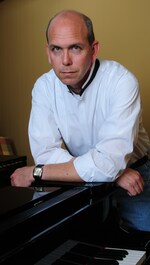Branford Marsalis, the eldest sibling of the current “First Family of Jazz” (the others being trumpeter Wynton, trombonist Delfeayo and percussionist Jason), brought his Quartet to the recently renovated Baldwin Auditorium at Duke University; his father is the renowned pianist Ellis Marsalis. However this was not his touring band – bassist Eric Revis and drummer Justin Faulkner were replaced by Russell Hall and Rudy Royston respectively. Joey Calderazzo is his longtime pianist; both Marsalis and Calderazzo are now Durham residents.
Branford has had an eclectic career that has embraced Classical music (working with the North Carolina Symphony) as well as Broadway plays and music, plus stints with Sting and the Grateful Dead; he was for a time Musical Director for the Tonight Show featuring Jay Leno. Being from New Orleans, much of his playing reflects his upbringing in the living traditions and roots of jazz. He did not hesitate to incorporate these elements in his ninety-minute show on Friday. Although he claimed not to have a set list, the quartet performed as a tightly knit group in their choice of tunes. He took the approach of opening with a distinctly “free jazz” piece at a breakneck tempo. In fact, to paraphrase a recent State of the Union column by the national commentator George Will, the whole tenor of the concert could be described as a “…carefully choreographed cacophony of spontaneity and synthetic earnestness…” culminating in sixty minutes of actual music. Too harsh? Possibly. But it allowed the group to “demonstrate” their prowess of technique followed by its application to more melodic tunes and ballads that were executed with sonorous depth and feeling.
Thus the program developed with five more pieces mainly featuring the interaction between sax, piano and drums with the bass providing the link between the rhythm and harmony. There was less totally “free jazz” in that; while the solos were interestingly constructed and usually built to a climax, there was always a strong rhythmic component or pulse that enabled the tune to swing to a greater or lesser extent. In this regard, drummer Royston tended to overplay both in volume and complexity of execution at times, so much so that it had the effect of appearing to compete with the soloist rather than complement him. This not only distracted the listener but on occasion severely detracted from the appreciation of the piece. The overbearing display of technique and volume resulted in a lack of subtlety that could have added color to the music. An exception was the one “standard” played, George Gershwin’s “Our Love Is Here to Stay” where the drummer used brushes (gasp!) – at least to begin with; this tune featured the one bass solo of the evening that turned out to be pleasingly melodic. It would have been nice to hear more from Hall. A particular ballad called “A Thousand Arms” midway through the evening was a haunting tune where Branford elegantly demonstrated his master of the ballad and extracted exquisitely dynamic tones from the tenor saxophone without resorting to histrionics.
This review would not be complete without highlighting the invaluable contribution of Joey Calderazzo. He exhibited an extraordinary proficiency on the piano. He claims that he is the “polar opposite” of Branford; this may be true but somehow when they are playing “free” they clearly know where each is going, or in jazz-speak they do in fact know “where the one is.” This was evident on Friday evening on a very up-tempo (unnamed) bebop piece towards the end of their set with Branford playing tenor sax rather than his signature soprano instrument. After an incredible solo from Calderazzo (he sounded like Keith Jarrett on steroids at times!), Branford picked up flawlessly where Joey left off and basically they became dueling jazzmen (both winners though!)
A pleasant encore surprise was a guest appearance of tenor saxophonist Chad Eby (who teaches at UNC Greensboro) when the group launched into the New Orleans classic “St. James Infirmary Blues” This really showed off Marsalis’ traditional New Orleans “Second Line” roots that basically infected the entire band as well as the audience – so much so that a second encore ensued featuring a soprano saxophone-piano duet between Branford and Joey in a moving ballad entitled “Hope” by Calderazzo. It was a fitting ending to the concert where one was left with the overall impression that Branford Marsalis is indeed a Renaissance sax man!











